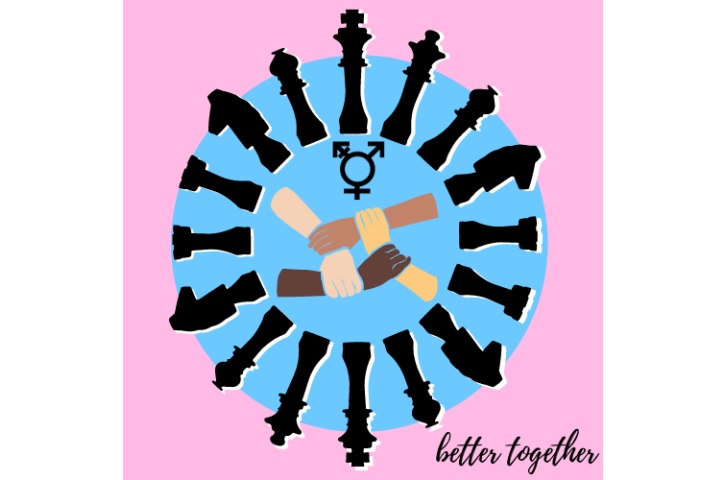


Winning starts with what you know
The new version 18 offers completely new possibilities for chess training and analysis: playing style analysis, search for strategic themes, access to 6 billion Lichess games, player preparation by matching Lichess games, download Chess.com games with built-in API, built-in cloud engine and much more.
Sexism has always been rampant in the chess community. Bobby Fischer, arguably one of the greatest chess players of all time, once remarked that women are "terrible chess players" and suggested that they busy themselves with domestic affairs. Former world champion Garry Kasparov has stated, "there is real chess and women’s chess." He later recanted this message after Grandmaster Judit Polgar beat him in 2002, becoming the first woman to ever beat a world champion. Fischer and Kasparov are not the only grandmasters (or chess players, for that matter) to make these sorts of comments. And, unlike Kasparov, most don’t rescind their opinions. Such sexist remarks and ideologies would be seen as incredibly outdated and unacceptable elsewhere. Yet, in the chess world, these misogynistic attitudes seem to be mainstream.
Brought on by the virality of the Netflix series The Queen’s Gambit, there has been a recent rise in discussion over the gender gap in chess. It seems that while no articles deny the presence of a gender gap, the reasoning behind this gap largely varies. Some have (in a very misogynistic manner) suggested that there are biological differences between the way women’s brains and men’s brains are wired, therefore contributing to men performing better in chessー a game that requires intellect and critical thinking. This suggestion is just false; there is no evidence that supports an innate difference in the way women’s and men’s brains function. Some suggest that the lack of representation for women amongst grandmasters is due to the lack of participation of women in chess. This suggestion may partially explain the situation; as of January 2020, the percent of rated female players is about 15.6%, and only 37 of the 1,600+ international grandmasters are women. Others presume that sociological factors, like stereotyping and the undermining of women’s abilities, have contributed to the widening of this gap. This presumption may be true; in fact, according to some psychological studies, the presence of differences in performance levels between men and women is the result of "increasingly traditional gender-role attitudes." Many suppose that the gap is a result of some combination of all three. At the end of the day, the gender gap in chess doesn’t exist because of only lack of participation by women or only sociocultural elements. Rather, this gender gap is a result of various complex and highly nuanced factors that would require a whole different article (or even a lifetime of academic work) to fully address.

Attractive fiction: Beth Harmon after beating the World Champion in the successful series The Queen's Gambit | Photo: Netflix
Still, the point of the matter is that there is a gender gap in chess, and there have been extensive debates seeking to explain the differences between men and women as a method of explaining this gap. As a result, the chess community has become incredibly divided; the few women that are involved in chess have discriminatory experiences and feel at a disadvantage in succeeding within the chess world, and many men feel at a disadvantage as they may lack the opportunity women chess players have in accessing attractive women’s tournaments and receiving subsequent prize money.
Addressing Concerns in Conversations Around The Gender Gap in Chess
From the perspective of an academic whose research focus involves gender-based issues, the discussions around the gender gap in chess have been very alarming. First and foremost, the frequency and quantity of sexist discourse are worrying. For the purposes of clarification, I use Audre Lorde’s definition of sexism as "the belief in the inherent superiority of one sex over the other and thereby the right to dominance." Sexist comments are incredibly prevalent in chess articles discussing the gender gap. In one recent article from Chess24, one commenter stated, "On the same lines, since [the] brain is also a part of [the] body, I am saying that calculating or analytical ability of a man's brain is higher than that of woman's brain and hence, on an average, men will perform better." While there were certainly reassuring replies that countered this misogyny, there were also many replies that supported this statement, showing the continued prevalence of sexism within discussions surrounding gender in chess.
Secondly, many discussions about the gender gap in chess tend to assert the narrative that because men and women are theoretically equal, it is the fault of women for not putting in the effort to participate and excel in chess. For instance, in a recent ChessBase article, one commenter wrote, "If there are suddenly 10 million more women playing chess, you cannot simply assume they are going to be better than Judit Polgar. That is not how it works. You have to put [the effort] in it. How you do depends on how much you are willing to put into it, not on gender or race or geography or anything like that. It's as simple as that." The assertion of such a narrative is incredibly damaging because it refuses to recognize the differences in the social, cultural, systemic treatment of men and women, thus resulting in misnaming of differences and the failure to recognize and examine the institutional oppressions at play.

Judit Polgar, the best women player in history | Photo: Budapest Chess Festival
Thirdly, it seems that so much of the discussions around the gender gap in chess revolve around the need for scientific, mathematical proofー the backing of quantitative data. Qualitative analyses are typically not used or seen as a weakness to an argument, thus devaluing any sort of non-numerical data. As a result, observations and narratives by women in chess are not seen as useful or valuable to these discussions. Not only does this invalidate the discrimination experienced by women, but the dismissal of qualitative data and analyses is just bad research and bad analyses (trust me, as an academic, I know this to be true). Women’s experiences in chess can be incredibly different from that of men’s and that of one another’s. This is not a hard concept to grasp, yet many seem to have difficulty grappling with it.
Lastly, it should also be noted that an overwhelming amount of the voices that contribute to explanations and analyses over the chess gender gap are men. Like the chess community and the world of top chess players, men’s opinions and voices have overwhelmingly (and ironically) dominated a discussion involving gender inclusivity and equality in chess. There needs to be a diversification of voices within such discourse as it will lead to the recognition and broader education of varied experiences and opinions. For the sake of those underrepresented in the chess community and the chess world as a whole, the voices of minorities must be heard and respected. Currently, the chess world is incredibly divided. Not only is there an exclusion of lower-rated players and a sense of elitism in top-level chess, but there is an exclusion of minorities, especially women.
As a Taiwanese-American woman, I am asserting my voice in this conversation of the gender gap in chess. Reading these articles and scanning through the comments sections, there are so many questions that should be considered. What if we’re examining and labeling and analyzing these differences in all the wrong ways? What would happen if there was a proposition to make the chess community more inclusive rather than exclusive, more united rather than divided? What can we do as individuals and as a whole to make the chess world a more inclusive space?
We, as chess players and chess admirers, must begin to acknowledge differences in the systemic treatment of men and women. We need to embrace the differences in our individual and demographic experiences. We must work towards unity, but not homogeneity. Through this recognition and mutual respect, we can liberate ourselves from this tyranny of sexism and misogyny, of elitism and exclusion. The survival of chess and the sustainability of the chess community depend on the move towards inclusion and acceptance.
Working Towards Inclusivity, Together
Addressing and diminishing sexism and elitism in chess seems like a long, arduous, and painstaking process to achieve what may be deemed as vague and unattainable. But, there are several steps that can be taken to make the chess community more welcoming to people of all backgrounds. The following actions can be taken as individual beings, and as a whole community:
1. Acknowledge and celebrate differences:
Through the recognition of our differences, we can begin to identify the distortions, the systemic oppressions, the institutional forces that drive us to make certain choices, think certain ways, act on certain things. We shouldn’t use our differences to separate ourselves from one another, but we should certainly use differences to understand what systems we as individuals play into.
Differences should also be celebrated. It is through our differing experiences, opinions, and ways of thinking that we find nurture a sort of creativity and diversity. We may not always understand or relate to one another, but we can and should learn to respect and celebrate differences.
2. Be willing to learn from one another and from our own mistakes:
We should stay open-minded and always willing to engage in conversation with one another. We don’t have to agree with each other, but we can certainly learn from what others have to say, and we can grow to respect each other.
In the words of academic feminist Audre Lorde, "We are not perfect, but we are stronger and wiser than the sum of our errors." We cannot expect one another and ourselves to be saints. We are human beings, and we make mistakes. But, what is truly important is that we reflect upon the mistakes we make and put in the effort to do and be better. We must strive to grow.
3. Legitimize experiences as a form of knowledge:
Individual experiences are completely legitimate, and quantitative data isn’t needed to validate the experiences of the discriminated and oppressed. This is not to invalidate the use of quantitative dataー when suitable, numerical data and quantitative analyses should certainly be applied. But, qualitative data and analyses are also valid. Both forms are reliable and can be used.
4. Move towards solidarity and unity:
Support women chess players and respect their skills and experiences. Strive to dedicate as much attention to women chess players and we do to chess players who are men. Perhaps titles for women chess players are not needed, but giving women a space to grow and feel supported through women’s tournaments is an important starting point. Understand that unity doesn’t mean homogeneity, and solidarity doesn’t mean only standing by one group. We can be unified and different. We can stand in solidarity with minority chess players while continuing to support others.
Closing the gender gap in chess is a struggle, and abolishing sexism in the chess community is just as, if not more, difficult. But, as the world progresses towards a brighter future, the chess community must strive to progress, as well. Together and as individuals, we can endeavor to learn and grow. Already quoted so many times in this article, I leave you again with the words of Audre Lorde:
"What we must do is commit ourselves to some future that can include each other and to work toward that future with the particular strengths of our individual identities."